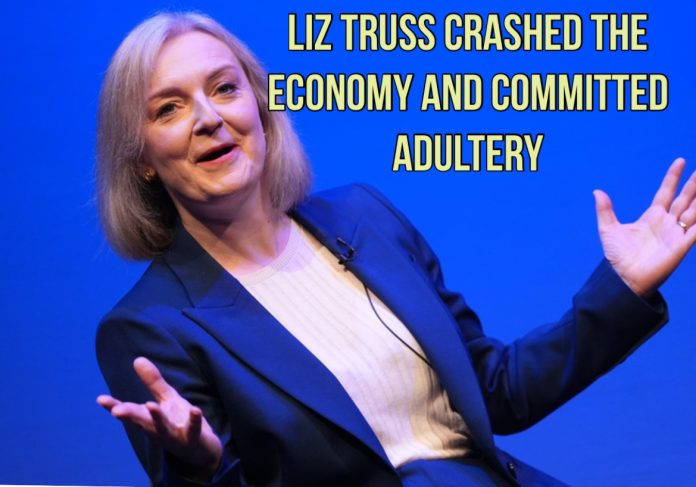Liz Truss’s premiership marked one of the most turbulent periods in modern British politics. Her rapid ascent to the highest office, followed by an equally swift and dramatic fall, has left an indelible imprint on the UK’s political and economic landscape. While her economic policies were criticised for triggering financial turmoil, her personal life, particularly her affair with a married MP, added another layer of controversy. This article critically examines Truss’s handling of the UK economy, her political decision-making, and the impact of her personal scandals on public perception and political accountability.
1. The Philosophy of Growth at Any Cost
Liz Truss entered office with an ambitious vision rooted in the ideology of economic libertarianism. Her “Trussonomics” was inspired by Thatcherite principles: deregulation, lower taxes, and a misguided belief in the power of free markets to generate growth. In her campaign for leadership, Truss repeatedly argued that the UK’s sluggish growth required bold and transformative measures, dismissing the more cautious fiscal strategies favoured by her rival, Rishi Sunak.
At the core of Truss’s economic vision was the belief that reducing taxes for high earners and corporations would unleash entrepreneurial activity, thereby stimulating the economy. However, this approach, which prioritised growth over redistribution, failed to account for the broader economic context, including a post-pandemic recovery, Brexit-related challenges, and a worsening cost-of-living crisis.
2. The Mini-Budget: An Experiment in Chaos
The defining moment of Truss’s premiership came with the unveiling of her government’s “mini-budget” in September 2022. Introduced by her Chancellor of the Exchequer, Kwasi Kwarteng, the budget proposed sweeping tax cuts, including the elimination of the 45p tax rate for top earners and the reversal of planned corporation tax increases. These measures were coupled with significant energy subsidies to mitigate rising costs.
However, the budget lacked crucial components: a funding plan and independent economic analysis from the Office for Budget Responsibility (OBR). The markets reacted with alarm. The pound sterling plunged to historic lows against the US dollar, while gilt yields soared, threatening the stability of pension funds. The Bank of England was forced to intervene with an emergency bond-buying programme to prevent a full-scale financial crisis.
The government’s failure to communicate its plans effectively and to secure market confidence highlighted a lack of political and economic foresight. The episode raised fundamental questions about Truss’s competence as a leader and her ability to manage the complex interplay between policy ambition and market reality.

3. The Political Fallout
Truss’s economic missteps triggered a cascade of political consequences. The backlash from both the public and her own party was swift. Many within the Conservative Party criticised her for prioritising ideological purity over pragmatic governance, with some even calling her approach reckless. The rebellion within her own ranks ultimately forced Truss to reverse several of her flagship policies, including the proposed tax cuts.
Despite these U-turns, the damage was done. Truss’s premiership lost credibility, and her authority within the party eroded rapidly. Her resignation after just 49 days in office cemented her legacy as the shortest-serving Prime Minister in British history, a distinction that underscored the gravity of her leadership failure.
Personal Scandals: The Affair with Mark Field
1. The Revelation
In the years preceding her rise to the premiership, Liz Truss was embroiled in a scandal that attracted significant media attention: her affair with Mark Field, a fellow Conservative MP. The extramarital relationship, which became public in 2006, reportedly contributed to the breakdown of Field’s marriage. While Truss’s marriage to Hugh O’Leary survived the ordeal, the scandal cast a shadow over her political career.
2. The Impact on Public Perception
While some argued that politicians’ private lives should remain separate from their professional responsibilities, others viewed the affair as indicative of poor judgment and a lack of accountability. For a public figure aspiring to high office, personal integrity is often scrutinised as closely as political competence. In Truss’s case, the affair amplified negative perceptions of her character, particularly among traditional Conservative voters who value family values and personal morality.
3. Broader Implications for Trust and Credibility
The affair also highlighted broader issues within the political class. The perception of a disconnect between politicians and the public was exacerbated by scandals such as Truss’s, reinforcing the narrative that Westminster was rife with privilege and impunity. For Truss, the personal controversy became yet another vulnerability, compounding the damage caused by her economic mismanagement.
The Wider Context: Structural Challenges and Party Divisions
1. A Nation in Crisis
Truss’s premiership did not occur in a vacuum. The UK faced a confluence of challenges, including the lingering effects of Brexit, a pandemic recovery fraught with economic uncertainty, and rising inflation driven by global supply chain disruptions and the war in Ukraine. These factors created a volatile environment that demanded careful and considered leadership; qualities many felt Truss lacked.
2. Conservative Party Infighting
Truss’s tenure also reflected deeper divisions within the Conservative Party. Her leadership campaign exposed ideological rifts between those favouring fiscal discipline and those advocating for radical growth-orientated policies. These divisions, coupled with her inability to unify the party, underscored the systemic challenges facing Conservative leadership in the post-Brexit era.
Conclusion: A Legacy of Missteps and Missed Opportunities
Liz Truss’s time as Prime Minister will be remembered as a cautionary tale of ambition outpacing ability. Her economic policies were marred by economic illiteracy, poor execution, and a failure to anticipate their consequences. Meanwhile, her personal scandals further eroded public trust, offering ammunition to critics who questioned her judgement and integrity.
For future leaders, Truss’s experience serves as a stark reminder of the need for pragmatism, preparation, and a deep understanding of both policy and public sentiment. Her downfall also highlights the importance of moral and ethical leadership in a political landscape increasingly characterised by cynicism and disillusionment.
As the UK continues to navigate economic uncertainty and political instability, the lessons of Liz Truss’s tenure will undoubtedly inform the strategies of her successors. Whether these lessons are heeded, however, remains an open question. Boris Johnson’s serial philandering eventually caught up with his incompetence and lying. Hopefully the voters will not be conned so easily again into clutching narcissists to their bossoms.







